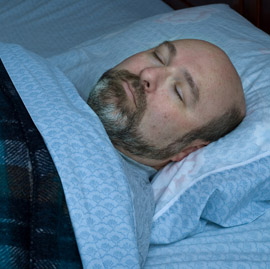To lose weight you need to get active, but first you need a good night’s rest.

How many hours of sleep did you get last night? Your answer to this question can have a big impact on your ability to lose weight. Adults who get less than six hours of sleep every night are more susceptible to weight gain and are at a greater risk of being overweight or obese. As you develop healthier habits after weight loss surgery, better quality sleep should be a high priority.
Sleep impacts every aspect of our health. It strengthens the immune system, rejuvenates cognitive function and boosts metabolism. Missing out on shuteye night after night can increase your risk for heart disease and stroke. There is even a high association between lack of sleep and diabetes. Yet every night, people opt to stay up to finish watching the game, read a few more pages of a book, finish some chores around the house or talk on the phone. None of these seem like essential tasks, but in the moment they will keep us awake and put our health at risk as a result.
Here are a few ways you can improve your sleep habits starting tonight:
- Set a bed time and keep it regular. Try to go to sleep and wake up close to the same time every day.
- If you weren’t able to sleep last night, take a nap. A 20 minute power-nap after work can make your evening much more manageable, and can cut your desire to snack for energy.
- Turn off the TV and remove distractions from your bedroom. Think of your bedroom as a sleep sanctuary.
- Push yourself to exercise more to tire yourself out.
- Turn down the air conditioning in your home at night to reduce night sweats.
Missing Sleep Leads to Weight Gain
Recently, researchers at the University of Colorado wanted to figure out just how closely sleep is connected to obesity. Participants were kept in a controlled environment where their sleeping and eating habits were monitored closely. Subjects who were deprived of sleep chose foods that were high in carbohydrates and ate more food in general than other groups who slept more. This resulted in an average gain of about two pounds a week for the sleep deprived participants, demonstrating how significantly lack of sleep can affect weight over time.
Every adult should get between seven and eight hours of sleep every night. If you are cutting yourself short then you are going to feel it. Your mind won’t work as quickly, your muscles will hurt and even your mood will suffer. When you miss out on sleep it becomes harder to avoid unhealthy foods and you are drawn to anything that might produce energy, like carbohydrates and caffeine. And of course, when you are overtired all the time, you probably won’t be keeping up with your workouts.
Getting weight loss surgery will make it easier to follow a healthy diet, but you need to set yourself up for weight loss success by adopting healthier habits like sleeping well. If you’ve been feeling drowsy lately and have had trouble keeping up with your diet and exercise routine as a result, try getting to bed a bit earlier tonight.


